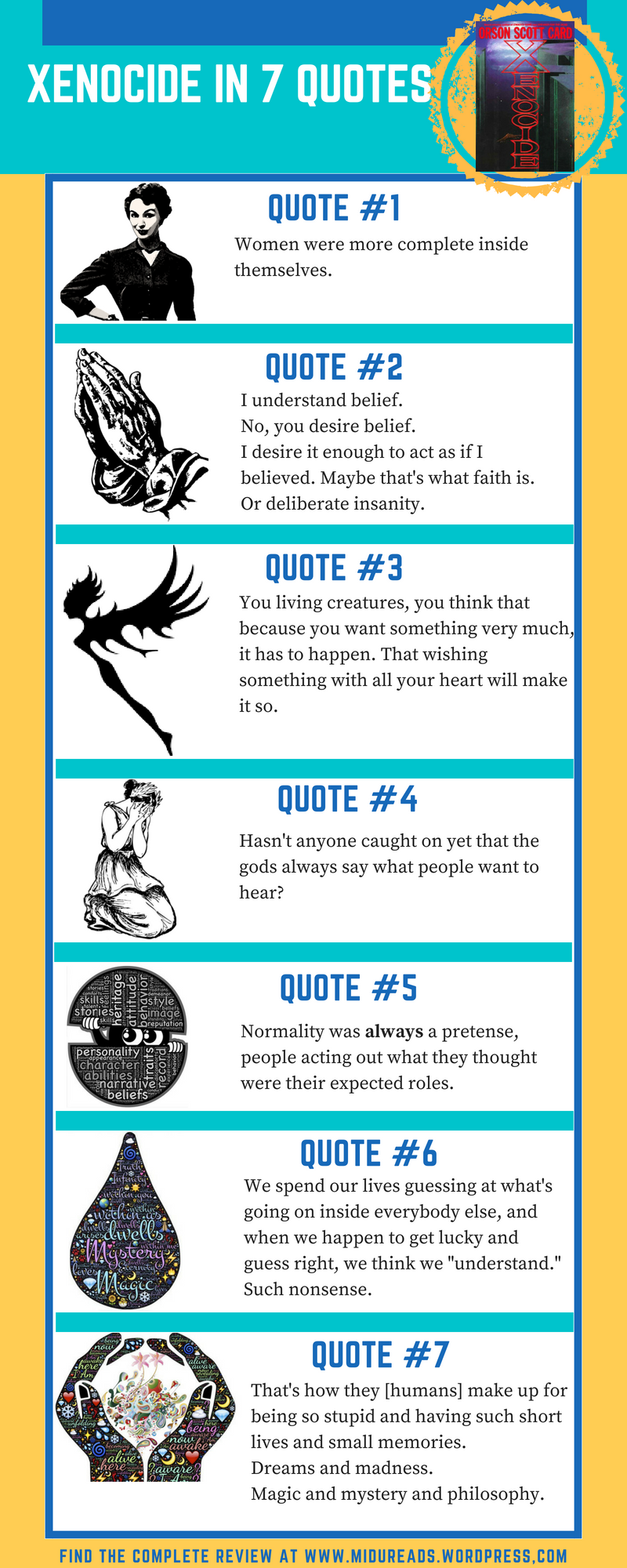


Originally published at midureads.wordpress.com on August 4, 2018.
I started reading this book at a weird time in my life. A loss that I’m still grieving and new changes make for bad companions. Those reasons could be why I enjoyed reading this book much more than I should have. You’ll see what I mean when I share the two contrasting views that I found myself taking while reading this story and reviewing it.
Grief is almost always for the mourner’s loss.
It got me wondering, was that the only reason I cried at my uncle’s funeral? And if it was, was it selfish of me to do so?
…that aching, hollow, half-panicked feeling returned. She isn’t here. I can’t just speak and have her answer. I can’t just ask and have her remember. I can’t just reach and feel her hand. And, most terrible of all: Perhaps I never will again.
While there isn’t a perhaps in my case, this eloquent quote says it all.
Does Mother know you’re going?
Please be practical, Miro. I have no fear of Satan, but Mother…
This is a conversation between two brothers. One of them is a priest and is going on a religious mission fraught with danger. Both are adults and the situation is a serious one but I have found and enjoyed such light humor in all Ender books.
You’re one tough son of a bitch, aren’t you?
Welders and smiths are tough. Sons of bitches have problems of their own.
Again, the same pair is conversing and the priest ends up swearing and impressing his brother.

Ender is quite annoying in this book. When he goes into non-space, he wishes his siblings into existence. One of them is dead, so maybe I could have swallowed that. Even though he is supposed to have created a hegemony and was the root of all evil in Ender’s life…yeah maybe I wouldn’t have bought this one either.
The other one is alive and with him yet he chooses to bring a younger version of her back to life. And don’t even get me started on the squickiness of how innocent and beautiful he makes her. Sister, dude. She is your sister, you creep! If this was just done so the author could have characters to base his next novel on, it is a shitty move. Shitty. Move.
Ender also seems to have found religion in this book. This is contradictory to the way his character was in the first two books. In fact, the whole heavyhanded way of dealing with religion was odd. There were the piggies — an alien race who were brought to Christianity. Then there was this throwaway line in the book about couples who aren’t interested in premarital sex are the ones that make the society more stable.
Another thing that weirded me out was Miro’s miraculous transformation. From the very beginning, we are shown that he is very bitter on account of being handicapped. That is a very ableist stance. Then we see him changing as he stops isolating himself and stops a bloody riot from getting even bloodier. This was a tad more positive but it was ruined when he goes into non-space and comes back healed. What did it all even mean? What purpose did his character serve?
Irritating and squabbling for no reason. I wanted to smack them all at least once. Another thing that bothered me was that in the previous book, they were the odd ones out. In this one, they have magically become all-important. Xenologists, priests, physicists and brickmakers, almost all of them have a say in how the planet should be run. And even though they are all adults and professionals, most of them behave like toddlers with no regard for the consequences of their actions. What’s more, when one of them is giving all the indications that they will be acting stupidly, the others (and the rest of the planet) do nothing to stop them. Then there is an uproar after the stupid thing is done!
A seemingly minor character who starts as a slave and then becomes the source of the cure for a whole population, Wang Mu was irritating at times but bearable. Then all of a sudden, she is fangirling over the long-dead Hegemon. That isn’t all though. The long-dead Hegemon is then recreated by his brother, visits Wang Mu, and flies away with her to take over the world. What is even happening? How much of my disbelief should I be suspending? Like all of it?
Faster than light travel isn’t possible. Hundreds of scientists have said so. Yet a physicist jailed for instigating a mob and his brickmaker brother come up with a solution i.e. a supercomputer can wish it into existence by holding the image in her mind. Wait, I am not done yet. While that is happening, the xenologist sister of theirs will hold the image of two things in her mind that will solve all their problems.
So, this is what I thought of the book. Feel free to share your thoughts!

As my husband drove me to work the Monday after his father died, I said, “I wish we had a Speaker for the Dead for your dad.”
He said, “I was thinking the exact same thing.”
In Orson Scott Card’s novel of the same name, the second in the Ender’s saga, a Speaker for the Dead is a person whose job is to carefully, compassionately, and objectively examine the life of someone who has passed away, reconstructing an honest picture of the deceased that is shared at the funeral. The Speaker is a professional and an outsider, not someone who knew the deceased in life. The idea is that the Speaker may be able to find beauty and meaning in ways that those closest to the dead may not be able to and to find compassion even for those who may not have led exemplary lives. [As a side note, Orson Scott Card’s Speaker for the Dead would have his work cut out for him attempting to make sense of OSC’s early fiction’s messages of inclusivity and his later vitriol against the GLBT community, which is explored thoughtfully by the fine gentlemen of Overdue if you’re interested in hearing more.]
It’s been over 10 years since I read Speaker, so I’m a little fuzzy on the details, but what I do remember is that in the book Ender had to wrestle to find compassion and meaning in the life of a man that, to most of the world, looked like an abusive no-account.
As we reflected on my father-in-law’s life, collecting stories for the minister and for the obituary, I longed for someone who could make sense of a complicated life that had ended, and the complicated ripples that remained in the lives of his children, his siblings, and the others who were close to him.
Following an unspoken rule that we do not speak ill of the dead, his children shared stories and happy memories of their father’s hard work, compassion, generous nature, sense of humor, and resourcefulness. Choosing “The Good Samaritan” as the Gospel reading for the funeral, they talked about how he could never turn away anyone who needed help, often allowing people who were down on their luck to live in his home when they might have ended up on the street otherwise. After one glowing story from his daughter, his ex-wife commented, “I don’t remember your father that way, but I’m glad that you do.”
And therein lies the truth, that a single man can be so many different things to different people, and so many different things even to one person. Every beautiful story and memory told about him was true. But what was also true was the unspoken or the tactfully avoided, the vices that were no small part of the man’s life, that in fact loomed large enough to cost him his long marriage to a good woman and the mother of his children.
How nice if someone else could come in and make sense of it all.
But while our shared literary reference provided us some comfort and a shorthand language in which to communicate about my father-in-law’s life and death in the midst of a hellish, heartbreaking week, we knew that no Speaker was available to take this burden from his family’s shoulders.
At a meeting with our pastor, my husband talked openly about some of his father’s shortcomings. The pastor said diplomatically, “I won’t mention any of that.”
The beauty of a Speaker for the Dead, though, is that he WOULD have mentioned that, the good and the bad, and somehow made it all okay, all beautiful, all a piece of one rich and complex and completed life.
After the eulogy, the pastor invited those gathered to share stories about my husband’s father. Not surprisingly, a case of Midwestern shyness kept a room full of  boisterous, story-rich family and friends silent.
boisterous, story-rich family and friends silent.
The pastor pressed on. “One word to describe him,” he suggested.
“Hardworking,” my husband said.
“Generous,” said someone else.
“Determined,” said another.
A smattering of complimentary adjectives and agreements followed, until his sister blurted out, “Ornery!” Amidst the knowing laughter, his daughter muttered, “Stubborn.”
The pastor said, “Ah, now the truth comes out!”
Of course, the truth was in the hearts of those gathered all along. And while no one person alone could find a way to articulate the sometimes muddled tapestry that had been the man’s life the way that a Speaker for the Dead might have done, a room full of those who loved and knew him best turned out to be pretty adequate Speakers after all.